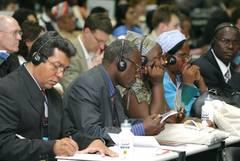More articles and free photos at
Approving a substantial change in priorities and culture, the World Council of Churches (WCC) 9th Assembly completed its meeting with prayer in Porto Alegre Thursday, and agreed to give priority to spirituality, ecumenical formation, global justice and prophetic witness.
The Assembly set a new agenda for the WCC in the coming period in its church and ecumenical relationships, agreed on several major programmatic initiatives for the fellowship, and elected a new top governing body to lead the organization into its new mandate.
"This Assembly has affirmed the vitality of the ecumenical movement and the commitment of the churches to the ecumenical vision and goal of unity, and to strive for a more just and peaceful world," said WCC general secretary Rev. Dr Samuel Kobia following the closure of the event.
The 9th Assembly was the first to be held in Latin America since the Council´s creation in 1948, and the host churches from Brazil and the broader region were actively involved in the event. The rich daily prayer life of the gathering was combined with Sunday worship in local Protestant, Catholic and Orthodox congregations.
The Assembly met in Porto Alegre, Brazil, 14-23 February 2006, and gathered over 4,000 participants, including 691 delegates from the 348 member churches of the WCC, and representatives and observers from other churches, organizations and movements.
<p class="nospace"» New constitution
During the first week of the Assembly, delegates adopted a substantially revised Constitution and Rules which move the WCC to decision-making based on consensus and which amend membership criteria. The reforms stem from concerns articulated by Orthodox member churches, and aim to strengthen participation of churches from diverse cultures and traditions.
<p class="nospace"»Church unity
Addressing the core issues of Christian unity, the Assembly agreed on a new text, "Called to be the One Church," and urged that WCC and its member churches give priority to the questions of unity, catholicity, baptism and prayer.
The delegates called for renewed efforts to manifest visible church unity which would allow the ecumenical movement to offer to the world the "coherent, grace-filled spiritual message of Christianity".
The Assembly pointed to ways in which collaboration with the Roman Catholic Church, which is not a member of the WCC, and with Pentecostal churches could be reinforced in the coming period. Delegates agreed to develop ways of working with other church groupings that "improve cooperation and coherence of message" of all the ecumenical instruments.
Following an appeal from the general secretary, the Assembly supported a proposal to "explore the feasibility of a structure for WCC assemblies" that could be linked to global meetings of other church bodies in the coming years.
<p class="nospace"» Youth participation
For the first time, young adults appointed by the churches participated in all Assembly committee work, and delegates urged steps to strengthen active involvement of youth (under 30 years) in the life and work of the Council. The Assembly endorsed proposals to create a special body to represent young adults in the decision-making and leadership of the Council.
<p class="nospace"» Programme priorities
Recognising a rapidly-evolving church and social context, and faced with a decline in income, the delegates agreed to focus future WCC work on a limited number of core issues and urged the WCC to "claim a clearer and stronger public profile in its witness to the world".
"The WCC should do less, do it well, in an integrated, collaborative and interactive approach," said the Rev. Dr Walter Altmann (Evangelical Lutheran Church of Brazil), moderator of the programme guidelines committee which formulated the proposals. Calling for a strengthened theological basis for all areas of activity, the delegates also pointed to the need for comprehensive planning and communication strategies "to build engagement and ownership by the churches".
The programme priorities centre on four areas of engagement: unity, spirituality and mission; ecumenical formation focusing on youth in particular; global justice; and bringing a credible voice and prophetic witness to the world.
The Assembly affirmed that WCC should expand its work on alternatives to economic globalization, deepening the theological and analytical grounding of this work, and sharing "practical, positive approaches from the churches".
<p class="nospace"» Churches seeking peace
The mid-term of WCC's Decade to Overcome Violence (DOV) was celebrated at the Assembly - which received messages from three Nobel Peace Prize-winners - and the delegates recommended that the WCC move towards an international Ecumenical Peace Convocation. A candlelight vigil for peace was held in central Porto Alegre to launch the Latin American annual focus for the DOV.
<p class="nospace"»Public issues
The Assembly took action on several issues of international concern. Delegates approved statements on the protection of vulnerable populations; terrorism, counter-terrorism and human rights; nuclear disarmament; the Latin American region; water for life; and the reform of the UN. Responding to widespread inter-communal and inter-religious violence related to caricatures of the Prophet Mohammed, the Assembly voiced its concern for mutual respect, responsibility and dialogue with people of other faiths. Delegates also expressed grave concern about the situation in Northern Uganda.
<p class="nospace"» New governing bodies
The Assembly elected a 150-person central committee, which serves as the main decision-making body of the Council between assemblies. The new committee counts 63 women and 22 young adults. The Assembly also appointed eight presidents to represent the Council in their respective regions.
The central committee elected Rev. Dr Walter Altmann (Evangelical Lutheran Church of Brazil) as moderator, and as vice-moderators Metropolitan Gennadios of Sassima (Ecumenical Patriarchate of Constantinople) and Rev. Dr Margaretha M. Hendriks-Ririmasse, Protestant Church in the Moluccas (Indonesia).
Assembly website:www.wcc-assembly.info
